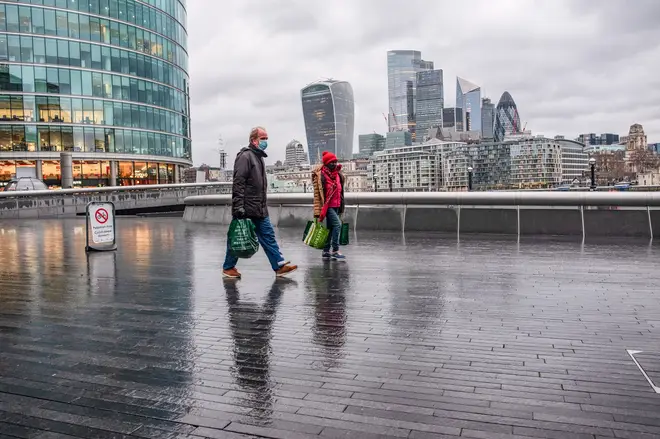
Iain Dale 10am - 1pm
21 January 2021, 11:24 | Updated: 21 January 2021, 12:27

Covid-19 infections in England may have gone up at the beginning of the current lockdown, a new study has shown, leading scientists to warn restrictions may not be working.
Professor Paul Elliot, who is leading the React study at Imperial College London, has suggested current measures may not be strict enough to see cases come down at a fast enough rate.
The study on 143,000 people, who were randomly selected, looked at the prevalence of coronavirus including in people without symptoms.
Infections from January 6 to 15 were 50% higher than in early December, the study found.
READ MORE: 'There will be more to come': Boris Johnson warns as UK sees record Covid deaths
READ MORE: AstraZeneca vaccine factory in Wrexham saved from flooding
England’s third national lockdown started on January 5.
On Wednesday night, Prof Elliott warned that if Covid-19 prevalence continues to be high "more and more lives will be lost".
He added: "Our data are showing worrying suggestions of a recent uptick in infections which we will continue to monitor closely.
"To prevent our already stretched health system from becoming overwhelmed, infections must be brought down; if prevalence continues at the high rate we are seeing then hospitals will continue to be put under immense pressure, and more and more lives will be lost."

Nick Ferrari grills Gavin Williamson over trust in the Government
The Government said the React study does not yet take full account of the current lockdown measures.
But Health and Social Care Secretary Matt Hancock said findings "show why we must not let down our guard over the weeks to come."
"Infections across England are at very high levels and this will keep having a knock-on effect on the already significant pressures faced by our NHS and hospitals," he said.
"It is absolutely paramount that everyone plays their part to bring down infections.
"This means staying at home and only going out where absolutely necessary, reducing contact with others and maintaining social distancing."
Government data shows the number of new cases of Covid-19 per head of population has been falling in all regions of England.

Covid rule-breaker found in boot of car 160 miles from home
For example, in London, the rolling seven-day rate as of January 15 stood at 703.7 cases per 100,000 people - down from 1,053.4 a week earlier, and the lowest since the seven days to December 19.
Eastern England is currently recording a seven-day rate of 526.8, down from 763.5 and the lowest since December 20.
Mobility data in the study, carried out with Ipsos Mori, suggests movement decreased at the end of December, coinciding with Christmas, and increased at the start of January.
In the study, swab tests suggested 1.58% of all people had the virus in early January, up from 0.91% in December.
London had the highest level in the January period at 2.8%, up from 1.21% in early December.